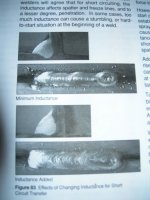captin_insano
Silver Member
- Joined
- Aug 24, 2007
- Messages
- 137
The smaller 220 volt machines are good for hobby work. you can make a good 110 work but you'll be wishing you spent the couple extra bucks so just do it. Now how thick they weld can depend on what shielding gas you use. Theres all kinds of shielding gas. For the hobby guy you cant go wrong with co2. Its cheap and lasts a long time. It also burns in better than the other common gases. The drawback is that co2 will cause more splatter. I have a variety of gases, co2, trimix and argon. I use the argon for aluminum and co2 for most of the steel work. I'll use trimix on occasion when welding sheet metal. I use flux core on all cast steels and for the heaviest jobs, like welding spider gears or suspension brackets onto thick axle tubes. Flux core will burn in the deepest and once you get the feel for it it works pretty good.
